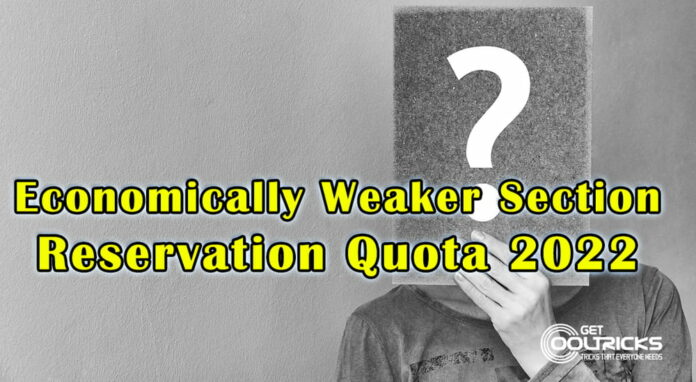Recent news
Recently, the Supreme Court (SC) questioned the government’s methodology for establishing an Rs. 8 lakh annual income ceiling for identifying the Economically Weaker Section (EWS) for the purpose of allocating a 10% quota in public services and educational institutions.
About EWS
- The 10% EWS quota was implemented by modifying Articles 15 and 16 of the 103rd Constitution (Amendment) Act, 2019.
- It added Articles 15 (6) and 16. (6).
- It is for the Economically Weaker Sections’ economic reservation in jobs and admissions to educational institutes (EWS).
- It was designed to advance the welfare of the poor who were not covered by the 50% quota policy for Scheduled Castes (SCs), Scheduled Tribes (STs), and Socially and Educationally Backward Classes (SEBC).
- It empowers both the Centre and the states to grant reservations to the economically weaker sections of society.
current status of the EWS quota
- The reservation for the EWS is being implemented by the Union Government for the second year now.
- Recruitment test results show that the category has a lower cut-off mark than the OBC, a point that has upset the traditional beneficiaries of reservation based on caste.
- The explanation is that only a small number of people are currently applying under the EWS category — one has to get an income certificate from the revenue authorities — and therefore the cut-off is low.
- However, when the number picks up over time, the cut-off marks are expected to rise.
significance
- Inequality is Addressed
The 10% quota is progressive and has the potential to reduce India’s educational and income inequality, as economically disadvantaged persons, have historically been excluded from higher educational institutions and public employment due to their financial inability. - Recognize Economic Backwardness
Numerous groups or classes other than the backward classes are afflicted by hunger and poverty.
The proposed reservation, which would be implemented through a constitutional change, would provide the poor of the upper castes constitutional recognition. - Reduction of Discrimination on the Basis of Caste
Additionally, it will progressively eliminate the stigma associated with the reservation, as the reservation has historically been associated with caste, and the upper caste frequently looks down on those who enter via reservation.
concerns about EWS
- Data Unavailability
- The EWS bill’s Statement of Object and Reason made it abundantly obvious that economically disadvantaged residents have generally been barred from higher educational institutions and public employment due to their financial inability to compete with economically privileged individuals.”
- This is at best a wild guess or speculation, given the government has provided no evidence to support this assertion.
- Exceeds the Reservation Cap
- In 1992, in the Indira Sawhney case, a nine-judge Constitution bench imposed a 50% ceiling.
- The EWS quota exceeds this limit, without even considering this concern.
- Arbitrary Standards
- The government’s standards for determining eligibility for this reservation are ambiguous and are not based on any evidence or analysis.
- Even the Supreme Court questioned the government on whether it considered the GDP per capita of each state while determining the monetary limit for EWS reservation.
- According to statistics, the per capita income of states varies significantly – Goa has the greatest per capita income of over Rs. 4 lakh, while Bihar has the lowest at Rs. 40,000.
Way forward
- Reservation has a detrimental effect on all categories except the EWS by reducing their competitive pool. It does not appear to be justified empirically, given that students from EWS are already strongly represented in higher educational institutions.
- It is past time for the Indian political elite to overcome its tendency to perpetually increase the scope of reservation in the name of electoral gains and recognise that it is not a cure for all ills.
- Rather than making reservations based on various factors, the government should prioritise school quality and other effective social upliftment efforts. It should instil an entrepreneurial spirit in them and teach them to be job creators rather than job seekers.
Conclusion
- Reservation is a constitutional scheme to ensure the participation of backward classes shoulder to shoulder with all citizens in the nation-building process.
- The EWS quota with the above-discussed ambiguities is the subversion of the constitutional scheme for reservation.


